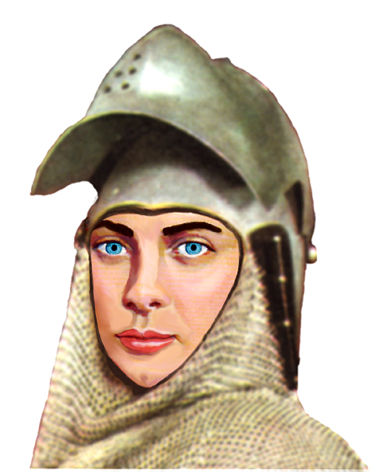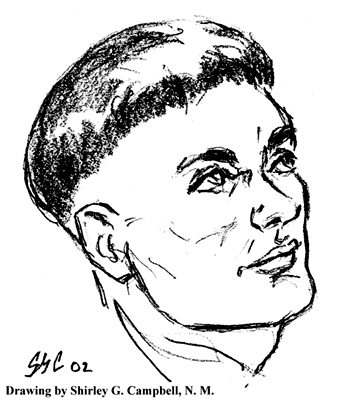
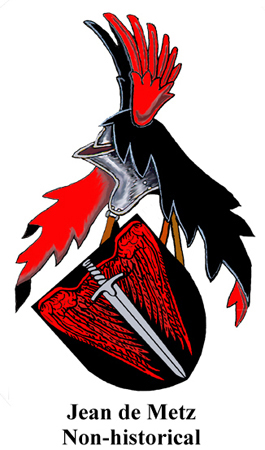


Jean de Metz, Part VII
CHAPTER 7
D'ALENÇON: JEANNE'S GOOD DUKE
While waiting for Jeanne's armor, standard and other provisions to be made, the Duke d'Alençon invited us to his home at Saint-Florentin-lés-Saumur. After morning Mass we left Tours and sailed comfortably down the Loire River. The warm sun shone brightly as the brisk breeze propelled us steadily along. All around us we could see the trees' tender buds and the tops of the fragile plant shoots peeping through the rich soil.
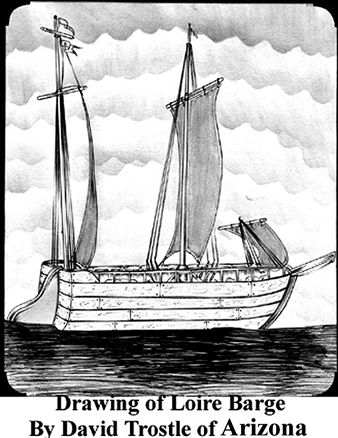
It was Jeanne's first boat ride. I watched with pleasure her childlike enthusiasm as her eyes darted from one scene to the next. I smiled as she marveled at the way the boat's large sail billowed in the breeze, or how she listened to the serenade of the creaks and groans caused by the gently rocking craft.
As the day wore on, she found a place to sit at the bow, where the boat's railings were the lowest and there she viewed the passing scene. I remember how she would give out little squeals of laughter whenever the cold river spray came at her. I gazed contentedly, watching the river breezes play with her short, black hair.
We arrived in the afternoon at the town of Saumur. Choice horses from the Duke d' Alençon's personal stables waited to transport us the two miles to his castle. Coming over a rise, I caught sight of his magnificent residence. We were no more than a quarter of a mile away when the blare of trumpets heralded our approach. In response, a flag depicting the Duke's family seal rose over the highest point of the castle.
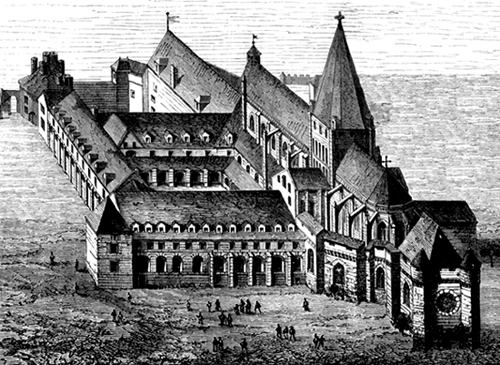
There to greet us were the Duke's mother, Madame Irene and his wife, Lady Thérèse. Two fine ladies of gentle and polite manner, at once made Jeanne feel welcome in their home. We spent the next three days at the Duke's estate. We occupied our days with pleasurable rides through the countryside or in hunting quail while our evenings were spent in quiet, courtly discussion with the Duke and his family.
Jeanne was pleasant but reserved. This type of frivolous conversation made her feel uncomfortable because, to her way of thinking, a person spoke only to express important ideas. Otherwise, the time was better spent in prayer. Madame Irene wisely suggested that Jeanne help her and Thérèse with their unfinished tapestry and to this she readily agreed.
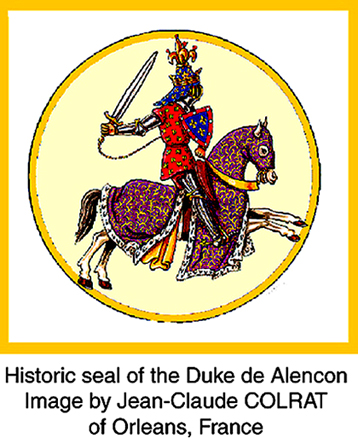
Fulfilling my office of attendant, I followed Jeanne and the Ladies to a large six-sided room with a large stone pillar gracing each corner. The windows of this well lit room were in the far wall and near it was the half-finished tapestry. Thérèse spoke as they entered. "Here in this room I spent many a sorrowful day as I worked on these tapestries. Do you see these two, Jeanne?" lady Thérèse asked while pointing to a hunting scene and a picture of King David. "We finished these two and started on this third one during the very long time that my beloved Jean was in the hands... of the English. Five long years I waited for him as his mother and I tried to raise his ransom of two hundred thousand gold francs. It has ruined us financially, but I do not care, because I have my Jean back."
Lady Irene added, "We were forced to sell everything that my son Jean owned, except of course, this castle and the surrounding lands. We sold all his ancestral lands in Normandy to the English. Yet it was not enough to win his freedom. I had to contact the Duke of Brittany to see if he would be interested in purchasing my late husband's estate at Fougeres. He eagerly agreed, but the Duke, that crude highwayman, offered us only half the amount that the lands were truly worth. What could we do? We had no choice! We had to sell to that vile man as our need for the money was so great."
Here the Lady's voice filled with bitterness. "Yes, the English finally released my son; that is true. But he was in such a terrible physical state that for the first several months we thought he was going to die. His eyes were sunken and lifeless, his cheeks hollow and drawn, his body but skin and bones. How many nights did we stay by his bedside praying for his recovery as we nursed him back to health."
Jeanne laughed, "Well, Ladies, he could never have looked any better than he does now."
Unable to control her fears any longer, Thérèse began to cry. Jeanne quickly came to her side trying to comfort her the best she could. Even though Lady Thérèse had known Jeanne only a short time, she admired and trusted her. "Jeanne, I am much afraid for my husband! He wants to go into battle with you and he was only recently released from prison. We have been obliged to spend so much money for his ransom that I would rather see him remain at home. Not only that, Jeanne, he could be hurt or killed or captured again. I do not want to lose him again!"
Gently, Jeanne wiped the tears from Thérèse's face. "I give you my solemn word that no harm will come to your beloved husband. Madame, have no fear! He shall indeed return to you." She smiled reassuringly, "As well as he is now, or perhaps even better!"
Thérèse rejoiced and embraced her. "Thank you, Jeanne. I believe you, and can now rest easier at my husband's leaving."
Jeanne, seeing my discomfort, gave me leave to join the other men as she and the Ladies settled down to their women's work.
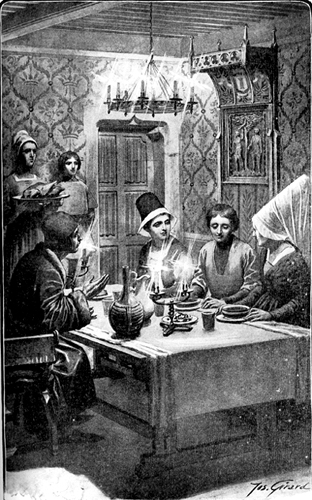
The next evening, after a wonderful day of quail hunting, we gathered around the parlor's raging fire. Entranced by the dance of the flames, the elderly Duchess waxed nostalgic. "What ever happened to honor and the code of chivalry that I remember from my childhood." She asked without expecting anyone to answer her. "I remember when knighted nobility honored and treated women with respect and deference!" She said wagging her head in disgust."
"OH, mother, please, we still do!" Protested the young Duke.
"Not like the old days, Jean. Not like the old days at all," the elderly lady insisted. Jeanne, curious to know more, brought her chair before Madame Irene, encouraging her to speak about her youth. "What do you mean by honor, Madame Irene?" Jeanne asked politely.
The Lady Irene smiled at Jeanne's naiveté and patted her face as she smiled. "Honor, Jeannette, without it we are nothing! Honor is the lifeblood for all nobility, whether that nobility be English, Burgundian or loyal to the Dauphin. Let me explain, little one, so that you will understand. Once a nobleman gives his word to do something, he is bound to honor it. Even if he gives his word, to his worst enemy, he is still bound to comply. The person who gives his word must follow through and do as he or she has promised no matter what the cost might be to him. Do you understand?"
Jeanne nodded, "A nobleman's honor and a nobleman's word are sacred things that must be guarded, protected and cherished. They are worth more than all the gold in the world, worth more even than his very life!"
The Duchess, surprised by Jeanne's quickness to grasp this concept, sat up in her chair. "Yes, Jeannette, that is exactly correct!"
""Tell me more, Madame," Jeanne begged.
"Well, Jeannette, let me tell you about knighthood and how it use to be." Madame Irene said, as her thoughts wandered back to her childhood, some sixty years before. "When I was a child the title of knight was not taken lightly, but was held to be very sacred. It was not like our present times, now that any brigand with enough money can buy the title without any concern for the high standards that this state in life calls a man to."
Jeanne intrigued by the idea, asked, "What are the high standards of a knight, Madame?"
The elderly matron smiled again. "Well, Jeannette, when I was a child, knighthood was considered sacred, like the priesthood, or the religious life for a woman. The knight went through his own religious ceremony and took his vows before a priest or bishop."
Jeanne's eyes widened in anticipation, "Please, Madame, tell me about this ceremony and the vows that you remember."
The Duchess silently nodded her head as she leaned back into her chair. "The evening before a squire's knighting he would go to church." She looked at Jeanne momentarily, as she added, "Jeannette, I will tell you about the ceremony that my saintly, older brother went through, because it is the most vivid in my mind. The evening before my brother Robert was to be knighted, he went to the cathedral. There in front of the bishop and all the assembly, he removed his attire and entered a large tub filled with water and there he knelt. The bishop placed his hand on his head as he directed my brother to immerse himself. This, my brother did and a moment later the bishop pulled on his arm as a signal for him to rise. The deacons helped my brother from the tub, drying and dressing him in special white clothing that was never worn before. The bishop explained that this ceremonial bath symbolized his leaving behind his old life and his emerging into the new life of a knight."
"My brother then knelt before the bishop who heard his confession. After confessing, he walked solemnly alongside the bishop up the cathedral's nave to the main altar. The rest of the assembled guests followed silently behind. Once at the altar, the bishop turned to face the people while my brother knelt once more before the bishop. It was here that he took on the vows of knighthood."
"What are the vows of knighthood, Lady Irene?" Jeanne questioned.
"Yes, child, yes, I will tell you. Listen and learn then," Madame Irene said as she waved her hand. "Robert knelt before the bishop to take the vows of knighthood. He swore unswerving belief in and obedience to the teachings of the Church and pledged to use his weapons only for sacred causes and ideals. He declared his willingness to defend, with his life's blood, in war against all the enemies of Christ and the Church. Swearing never to retreat before the enemy but always champion the right and the good, against all the forces of evil. He solemnly swore to respect and pity all those who were weak while steadfastly defending them and giving them generous alms. He swore his loyalty to and love for the king, as well as swearing strict obedience to his feudal overlord, so long as it did not conflict with his duty to God. Finally, he swore his loyalty to truth and his pledged word. Those are the vows that a true knight took and lived by."
"It was at this point in the ceremony that his sword and armor were taken in procession down the cathedral's nave and solemnly placed on the main altar. The bishop then said a prayer over him, after which, he, his assistants and the entire assembly silently withdrawn from the cathedral, leaving my brother alone for the night to pray and to keep vigil over his armor."
"At dawn, the bishop and all the assembly who had attended the evening before returned to the cathedral. In addition, the Lord who was going to knight my brother entered the cathedral with all his knights."
"My brother, Robert, was greatly blessed by God, for his liege Lord was non other than the Count of Longueville, the Duke of Molinas, the Great Constable of France, Bertrand Du Guesclin! Even at my very young age, my heart thrilled at the thought of being in his exalted presence. I too felt blessed by God."
"The Constable's men dressed my brother in his shining white armor. Robert then knelt before the Duke who used a sword to tap my brother's left shoulder. This is called the accolade, Jeannette. As he did so, Lord Du Guesclin, in a deep resonating voice declared, 'I dub thee Sir Robert. Be ye a valiant and true knight.' "
"The sword that the Duke used for the accolade was placed into my brother's empty sheath that hung at his side. The sacred ceremony ended when the golden spurs of knighthood were placed on his heels. At this point, we departed the cathedral singing joyous hymns."
"The whole assembly including the bishop and all his assistants, the Lord High Constable with his knights, and all of my brother's family and friends returned to my father's castle. Here my brother demonstrated his knightly skills in friendly bouts with the other knights. The long day ended in the great hall, where all the guests feasted on a sumptuous and extravagant fare, to the strains of beautiful and wondrous music. And that, Jeannette, was how my good brother Robert was knighted. I hope I did not bore you too much with my memories."
Jeanne spontaneously kissed her cheek as she emphatically said, "Oh no, my Lady Irene, it was wondrous and most enlightening. I thank you so very much for taking the time to tell me."
During the afternoon of the third day, Jeanne and d'Alençon were taking a quiet walk along the edge of the nearby forest. "My good Duke, what was it like to grow up in a castle as magnificent as this one?"
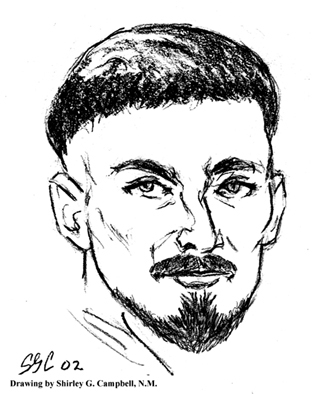
He let out a hearty laugh. "If you must know, my little soldier, I did not grow up here but in Normandy on my father's estate. I had a good life up to the age of eleven when my father died at the battle of Agincourt at the hands of the English King Henry."
His voice and facial expression quickly changed from laughter to barely controlled rage. "From that time on, I swore vengeance on all the English and lived for the day when I, too, could take up arms against my hated foes!"
"Why is it that all soldiers are filled with such rage and hatred?"
"I suppose because it helps us to fight better, Jeanne," the Duke turned his face from her intense gaze.
Calling me to her, Jeanne took our hands into hers. "My friends, you must remove this hate and anger totally from your hearts because it poisons your souls and takes you from the true love of God."
"But if we do that, we shall lose the strength in our sword arm! The fire in our belly that compels us to fight our enemies will be extinguished!" I protested while the Duke nodded in agreement.
Jeanne stood her ground. "Even if that were true, you must drive this evil from your hearts so that you can truly become God's warriors! I know that if you do this thing, God will replace this evil strength with His holy strength! You will find God's strength to be far more powerful than anything you have ever experienced before."
"Our struggle is righteous in God's sight. As for the English, they are displeasing to God, because they defy His will for them by invading and trying to conquer a land that doesn't belong to them. Remember how knighthood was in the past? Well, that is the way I want my soldiers to act! I want their bellies filled with God's holy fire that comes from a strong belief in the sacredness of our cause! I want my men's sword arms strengthened with the power that comes from the knowledge that they fight for God! Will you help me in this? Will you help me teach the army this tremendous truth?"
How could we say 'no' to her? Jeanne's holy fire had by now spread to us and we cheered, "YES! Yes, Jeanne, we shall help you!"
"Thank you, my friends! I knew I could count on you."
We walked on in silence, deep in our own thoughts, until Jeanne once more spoke. "Jean, my friend, what was it like to be a prisoner of the English?"
"May you never know, my little soldier, because it is something that I would never want to go through ever again!"
"Yet, will you not tell me?"
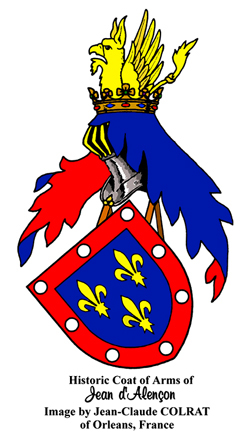
"If it pleases you, but I can't see how it would," he said softly as he rubbed the back of his neck. "I was eighteen at that time and was acting as the Dauphin's Lieutenant-General. I was taken prisoner by no less than the Duke of Bedford himself at the battle of Verneuil. After the battle, Bedford came to me and said, 'If you swear your loyalty to the Treaty of Troyes and ratify your loyalty to the English King, I shall let you go.' I must have had a suspicious look on my face because he repeated his offer. 'Yes, that is correct! I am asking you only to swear your loyalty to the Treaty of Troyes and then you can go in peace. What say you, young Duke d'Alençon?' "
The Duke's face hardened. "I could not believe my ears and for a short while I stood there in stunned silence. Then my anger rose up in me and I flatly rejected his offer. Bedford's countenance changed instantly to anger and he spat in my face. 'Then, my young whelp, you can rot in my prison at Le Crotoy until your family pays me one hundred thousand gold francs. I hope you will enjoy all those cold lonely days and nights that you will endure as you think back on an offer that will never come again!' With that he had his guard bind my hands tightly behind my back and they marched me off to prison."
"Jeanne, do you really want me to describe to you what I endured in my prison?" Her face was tense but with a quick silent nod she indicated her desire for him to continue. "As you wish. I was placed in a small, filthy, cold prison cell. I was fed a horrid English swill that was not fit to throw to a pig. More than once I thought I would go mad from the intense loneliness and degradation that I had to endure. And I would have died if it were not for my faithful squire who from time to time was allowed to bring me messages and some decent food from my family. That is really all there is to tell. By God's grace I survived my ordeal to fight once more." With that he said no more and Jeanne did not press him further.
We left early the next morning for our journey back to Tours. In this short time, the two ladies had grown very fond of Jeanne. They clung tightly to her and cried at the departure of 'their little warrior maid.' The Duke smiled as he waved her a fond farewell.
Jeanne became exuberant when she was informed that her armor, scabbard, and banners were ready and she gave her orders like an experienced captain. "Guyenne, find Ambleville and tell him to go to Monsieur Power's shop to pick up my standard and pennon. Tell him to bring them to Father Pasquerel's monastery. Then I want you to go to Monsieur de Lac's shop and pick up my armor and leather scabbard. Please bring them to the chapel."
Jeanne turned her attention to Louis and Raymond. "Louis, you are to run ahead to the monastery. Find Father Jean and ask his permission to use the chapel for the blessing of my standard, armor and sword. Go now! Raymond, I want you to find my household, as many as you can. Tell them to meet me at the chapel of the monastery."
Jeanne's face radiated her delight. "Ah, my friend! I am so happy and excited, for soon I shall be on my way to accomplish God's holy will."
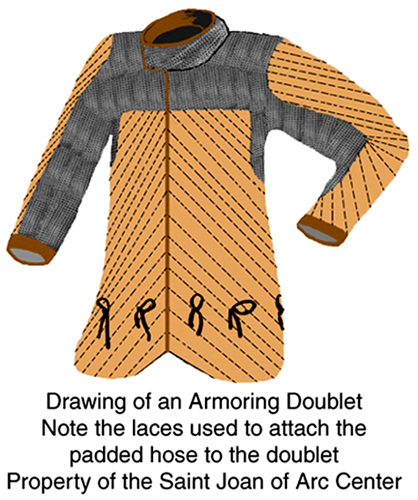
Shortly thereafter, we too, were in the vestry of the chapel where Jeanne was to put on the protective undergarments for her armor. They consisted of a thick armoring doublet, padded hose and heavy boots. The armoring doublet was made from a strong cloth and leather. It had a high, stiff collar that protected her neck from her helmet's chain mail. Areas not shielded by the armor plate had large patches of chain mail stitched to them. A chain mail skirt was tied about her waist to protect her hips, thighs and lower abdomen from injury. The padded hose used to protect her legs from chafing caused by the armor plate was also made from a strong material. This hose came up to her hips where it was attached to the doublet with twenty laces.
Her armor weighed fifty pounds. Even though this weight was distributed over her body, her ability to jump, climb, run and ride for days at a time amazed me. Even a seasoned campaigner often found it hard to remain in his armor for any length of time before it caused him pain. She was truly a hardy and rugged woman!
The clothing was cumbersome and difficult to get into, but Jeanne did not seem to mind. When dressed, she strolled around the vestry getting the feel of it. I asked sympathetically, knowing from personal experience, how, at first, new protective undergarments were unpleasant to wear, "Do you find it very uncomfortable, Jeanne?"
She vigorously moved her arms in all directions. "No, Angel, Monsieur de Lac did a very fine job of preparing the apparel. It will not take me long to become accustomed to it."
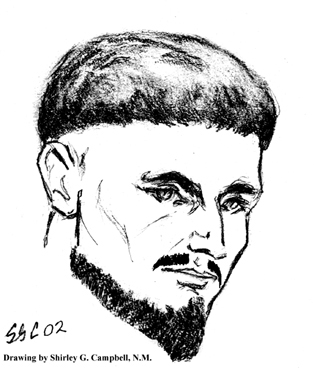
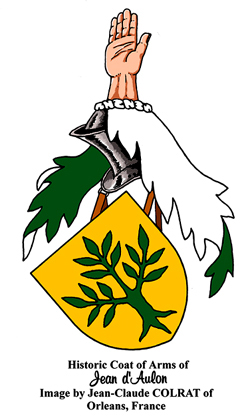
While I was helping Jeanne dress, Jean d'Aulon placed her armor and sacred sword upon the chapel's main altar. When all was ready for the ceremony, Raymond, holding her standard, took his place at the right of the altar while Louis, holding her pennon, stood on the left. The rest of her household formed a semi-circle before the altar.
The whiteness of the chapel's sandstone reflected, with marvelous effect, the varied colors of the beautiful stained glass. The strong sunlight streamed in through these magnificent windows to light our way down the nave. The incense prepared for the ceremony mixed with the sweet smell of the burning wax. The oldest altar boy who carried the processional crucifix led us into the chapel. The two smaller boys, carrying the lighted candles, entered next. Father Pasquerel held a large copy of the Gospels in both hands as he entered the chapel singing the words from Psalm 44:
"You are my King and my God; You give victory to Your people. By Your power, we defeated our enemies; by Your presence, we overcame our adversaries. I do not trust in my bow or trust in my sword to save me; because You have saved us from our enemies, You have defeated those who hate us. We shall always praise You and give thanks to You forever."
As she entered the chapel, Jeanne faced and genuflected to Christ's presence in the Blessed Sacrament in the tabernacle. Then with her head held high and her hands folded in prayer before her breasts she advanced down the nave. I entered last, joining the rest of the staff before the ornately carved altar.
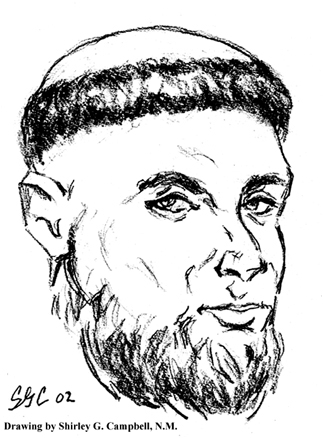
The boys placed their candles on either side of the altar. Then after genuflecting they moved to stand at attention by the sides of Jeanne's two pages. The altar boy who carried the crucifix now took his place beside Father Jean. Jeanne came to a standstill before the altar's tabernacle and once again genuflected. After this, she moved and stood to the right, while Father Pasquerel stood in the center. Next, receiving a container of holy water from one of the altar boys, the good Father began to bless Jeanne's armor, sword and banners by making the sign of the cross over them. "May this armor, sword, and banners be used in the service of the Lord. May God use Jeanne to bring peace to this war-weary land."
Solemnly all answered, "Amen."
While Jeanne humbly knelt before him, Father sprinkled holy water on her. "May the Lord guide Jeanne to accomplish His will in all that she does."
"Amen."
In a clear voice Father Jean prayed, "May the Lord bless her armor, sword and banners, in the name of the Father and of the Son and of the Holy Ghost." We shouted in response, 'Amen,' the sound of which reverberated off the high vaulted ceiling.
As d'Aulon applied Jeanne's armor, Father Pasquerel read:
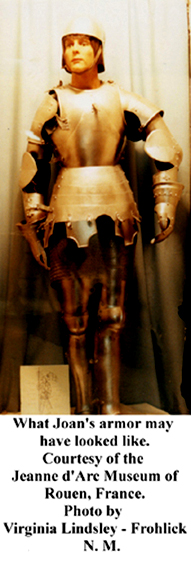
"Finally, be strong in the Lord and in His mighty strength. Put on the whole armor of God, so that you can take your stand against the wiles of the devil. For we are not struggling against flesh and blood, but against the dark powers of this world, and against the spiritual forces of evil in the heavenly places. Therefore take the whole armor of God, so that when the evil day comes, you may be able to stand your ground. Stand firm, therefore, with the belt of truth buckled around your waist, having put on the breastplate of righteousness, and having shod your feet with the armor of the gospel's peace. In addition to all this, take up the shield of faith, with which you can extinguish all the flaming arrows of the evil one. Take the helmet of salvation, and the sword of the Spirit, which is the word of God. Pray at all times in the Spirit."
Solemnly the good Father kissed the Scriptures as he placed it on the altar.
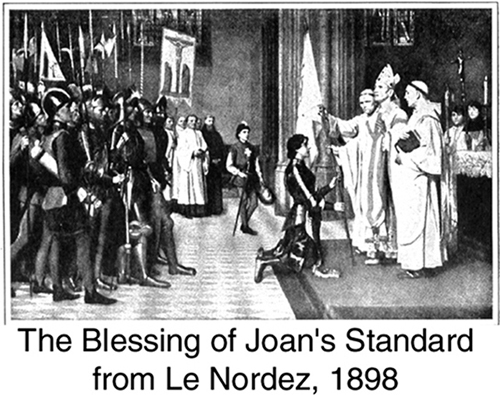
D'Aulon took the standard from Raymond and presented it to Father Pasquerel who, after blessing it, gave it to Jeanne. With tears pouring down her cheeks, she kissed the feet of the painted Christ and then returned the standard to Raymond. Louis marched forward to stand before Father, who with a grand gesture blessed the pennon. Louis then returned to his place.
D'Aulon then went to the altar and reverently picked up Jeanne's sword, which he took before Father Jean. After the blessing, d'Aulon presented the sword of St. Catherine to Jeanne, who received it devoutly with a kiss on its hilt. Taking the sword by the lower end of the blade, Jeanne raised it high over her head, saying, "It is God Who commands it!" The blade, catching the sun's rays, brightened with a fiery glow. All were awestruck and most sank to their knees while we crossed ourselves. A moment later, Jeanne placed the sword into its scabbard.
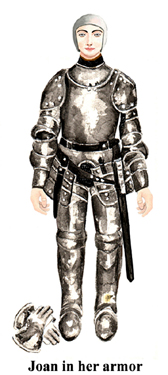
"My friends," Father Pasquerel began his sermon, "why do we consider Jeanne's sword sacred? It is sacred for three reasons. First, because it was miraculously found in a sacred place. Second, it is believed that this very sword defended the Kingdom, in the past, from the enemies of God. Third and most importantly, it is sacred because it will be used by Jeanne as a symbol of her sacred mission, which God has given her."
"Friends, this is a holy day, for we are starting down a new road. No longer will we fight just for an earthly king. No! We shall fight for God! We no longer belong to an earthly army, but we have joined God's Heavenly Host to do battle against the enemy, the Devil. In battle, kill only those you must, spare all those who ask mercy of you. We are not fighting to conquer another's land, nor for riches, power, or fame. We fight so that France might be free. Let the will of Our Lord and Savior be accomplished in our lives and even with our deaths, if He so wishes, for His greater Honor and Glory." Father ended his sermon with a rousing, "Amen!" And we in response sounded a jubilant, "Amen!"
Looking back on it now, I can see how prophetic his words turned out to be! With the service ended we processed out of the chapel. The eldest altar boy took the lead. Father Jean followed the two young boys. Jeanne came next, her Squire by her side, while the rest of her household followed close behind.

The procession ended in the monastery's garden to the sound of the chapel's blissful bells and the cheers of her friends. I gazed with awe upon her. How grand she looked, standing there with her white standard in hand! How her armor shone and sparkled in the sunlight! I was struck with the knowledge that God had favored me with this great honor. My eyes filled with tears then, as they do now, as I write down my memories... memories of the dearest and bravest comrade-in-arms I have ever known.
Jeanne, The Maid, was, no - IS - the living embodiment, the pure and perfect flower of knighthood.
